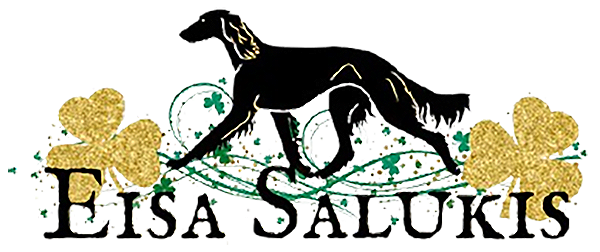THIS PAGE IS IN PROGRESS - BEAR WITH US
About Eisa Salukis:
Q: Where are you located?
A: We are located south of Atlanta near Barnseville, GA.
About Salukis:
Q: Are Salukis good apartment dogs?
A: Short answer is no. However, this is not to say that a Saluki cannot live in an apartment if you are dedicated to taking your Saluki for frequent walks and free runs in a safe, fenced area. It is not ideal, but it is possible. Stella, my first saluki lived her first several months in an apartment. This did require me to get up very early in the morning and take her to the fenced dog park while no other dogs were there so that she could run and play. She also got several walks a day and lots of enriching activities to keep her busy and happy.
Q: Can I let my Saluki run free in an unfenced area?
A: I do not recommend letting your Saluki run free in an unfenced area. Salukis are notorious for a very poor recall. However, there are always exceptions to the rule and some Salukis will return when called. It is important to remember that at anytime instinct can kick in and your Saluki might take off after prey and encounter a deadly situation. It is always best to let your Saluki run free in a securely fenced area to ensure their safety.
Q: Do I need to have a fenced yard to own a Saluki?
A: Short answer, YES! Salukis require a lot of free running and enjoy it. It is necessary for their mental and physical health. They can also jump quite high from standing still so a 5-6 foot fence is ideal. This will depend on the breeder and their requirements. It is Eisa Salukis' requirement for you to have a fenced in yard.
Q: Do Salukis make good therapy dogs?
A: Salukis can make great therapy dogs. Salukis typically are aloof and reserved with strangers, but there are some who enjoy being with all people and make great service and therapy dogs.
Q: What kind of things can a Saluki be trained to do?
A: Salukis can essentially do anything any other dog can do, if they think it is fun. Salukis are independent thinkers and often think what you want them to do is dumb, unless it is their idea. They get bored very easily and are extremely smart. Salukis can do obedience, agility, rally, barn hunt, dock diving and many other fun things. If you want a dog for obedience, this might not be the breed for you. However, there are some Salukis that excel at it. It depends on the Saluki's personality and desire to please.
About Showing Dogs:
Q: What is a professional handler?
A: A professional handler is an individual whose job is to show and campaign dogs for a client. They typically make their living showing dogs for clients and traveling all over the country to ensure the dogs get exposure and their goals are achieved.
Q: How do you learn to handle dogs?
A: I attribute handling dogs to art. It requires dedication, time, and some natural skill to hone in this craft. Handling is providing the "frame" to the dog you are showing, to present them in the best way possible. There are many resources that help people learn to handle their dogs. Get a dog, find a local club and get plugged into handling classes. Watch professional handlers at the dog shows and learn some of their techniques used for the breeds they show. Below are some links to great resources to get started. If you have further questions please contact me for further help and information. I would be happy to help!
Q: How do you enter a dog show?
A: You can learn how to get started in dog shows by clicking here. For one on one help please contact me.
Q: Does my dog have to be AKC registered to show it?
A: Yes, your dog has to be registered with AKC to particpate in AKC events. However, if you have a rescue dog or a dog who may be purebred but does not have registratio papers, there are ways to get a specific number so that you can particpate in events (i.e. obedience, agility, rally, etc) with your dog. However, in order to show in AKC conformration your dog will need to be registered with AKC to show them at AKC events, be purebred and unaltered. This rule applies to other clubs as well but they are not as strict when it comes to getting started.
Q: How do I become a Junior Handler?
A: Becoming a junior handler requires you to be 18 and under and own a purebred dog. Your dog can be altered. You can read more about it by clicking here.

